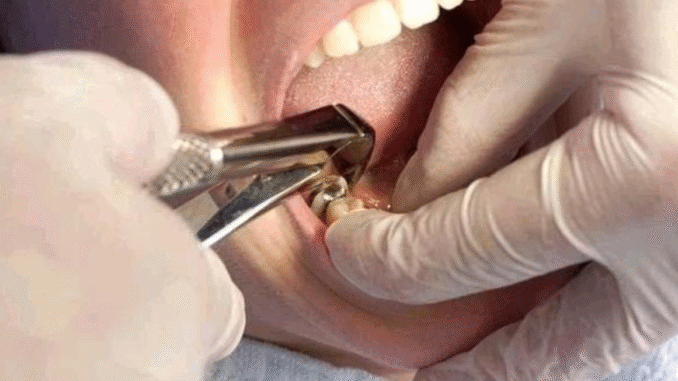
Understanding Toothaches and Holes in Teeth
Toothaches often result from cavities, enamel erosion, or exposed dentin due to holes in teeth caused by decay. These holes allow bacteria to irritate nerves, leading to pain, sensitivity, or inflammation. Other causes include gum disease, cracked teeth, or food trapped in cavities. While these remedies can soothe symptoms, they are not a substitute for dental treatment, especially for cavities or holes, which require professional intervention like fillings or root canals.
1. Saltwater Rinse
A saltwater rinse is one of the simplest and most effective remedies for tooth pain. Salt has natural antiseptic properties that can reduce inflammation, clean the affected area, and dislodge food particles stuck in holes or cavities….CONTINUE FULL READING>>>
How to Use: Mix 1 teaspoon of salt in a glass of warm water. Swish the solution in your mouth for 30 seconds, focusing on the painful area, then spit it out. Repeat 2–3 times daily or as needed.
Why It Works: The saltwater reduces bacteria and soothes irritated gums, providing quick relief from pain caused by cavities or minor infections.
2. Clove Oil
Clove oil contains eugenol, a natural anesthetic and antiseptic that can numb tooth pain and fight infection. It’s particularly effective for pain caused by holes in teeth, where exposed nerves cause sensitivity.
How to Use: Dab a small amount of clove oil (diluted with a carrier oil like olive oil if too strong) onto a cotton ball and apply it directly to the affected tooth or hole. Alternatively, chew a whole clove gently near the painful area. Use sparingly to avoid irritation.
Why It Works: Eugenol numbs the area and reduces inflammation, offering relief within minutes. A 2017 study in The Journal of Dentistry confirmed clove oil’s efficacy as a natural analgesic for dental pain.
3. Cold Compress
For toothaches accompanied by swelling or inflammation, a cold compress can work wonders. This remedy is ideal if the pain stems from a hole in the tooth causing gum irritation or an abscess.
How to Use: Wrap an ice pack or a bag of frozen peas in a clean cloth and apply it to the outside of your cheek near the painful area for 15–20 minutes. Repeat every few hours.
Why It Works: The cold reduces swelling and numbs the nerves, dulling the pain. It’s especially helpful for throbbing pain or sensitivity caused by inflammation.
4. Garlic Paste
Garlic has antibacterial and anti-inflammatory properties, thanks to allicin, a compound released when garlic is crushed. It can help reduce pain and prevent infection in cavities or holes in teeth.
How to Use: Crush a fresh garlic clove to form a paste, mix with a pinch of salt, and apply it to the affected tooth. Leave it for a few minutes before rinsing with water. Repeat 1–2 times daily.
Why It Works: Garlic’s antimicrobial properties can reduce bacteria in cavities, while its anti-inflammatory effects soothe pain. Be cautious, as garlic may irritate sensitive gums.
5. Peppermint Tea or Oil
Peppermint contains menthol, a natural cooling agent with mild numbing properties, making it a great remedy for toothache. It can also freshen breath and reduce discomfort from holes in teeth.
How to Use: Steep a peppermint tea bag in hot water, let it cool slightly, and hold the warm tea bag against the painful tooth for 10–15 minutes. Alternatively, apply a drop of peppermint essential oil to a cotton ball and dab it on the affected area.
Why It Works: Menthol soothes the nerves and reduces pain perception, providing quick relief. Peppermint also has mild antibacterial properties to keep infections at bay.
Additional Tips for Managing Toothache
- Avoid Triggers: Stay away from very hot, cold, sweet, or acidic foods and drinks, as they can worsen pain in holes or sensitive teeth.
- Over-the-Counter Pain Relief: Ibuprofen or acetaminophen can help manage severe pain temporarily, but follow dosage instructions and consult a doctor if needed.
- Oral Hygiene: Gently brush and floss around the affected area to remove debris, but avoid aggressive brushing that could worsen irritation.
- Elevate Your Head: Sleeping with your head elevated can reduce blood flow to the area, easing throbbing pain at night.
When to See a Dentist
While these remedies can provide temporary relief, they don’t address the underlying cause of tooth pain or holes in teeth. Schedule a dental visit as soon as possible if you experience:
- Severe or persistent pain lasting more than 2–3 days
- Swelling, fever, or pus indicating an infection or abscess
- A noticeable hole or cavity in the tooth
- Pain that spreads to the jaw, ear, or face
A dentist can diagnose the issue and recommend treatments like fillings, crowns, or root canals to prevent complications like tooth loss or systemic infection…CONTINUE FULL READING>>>
